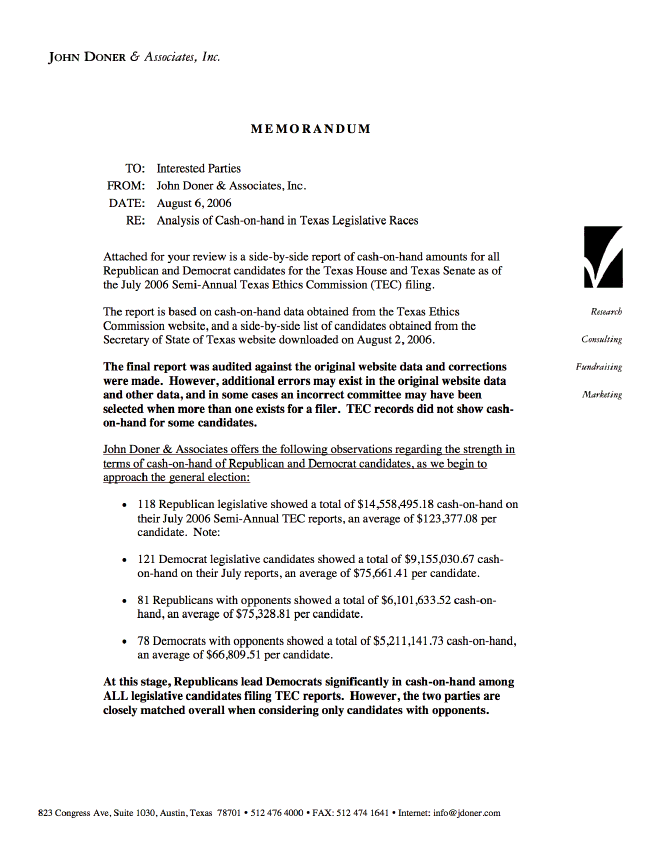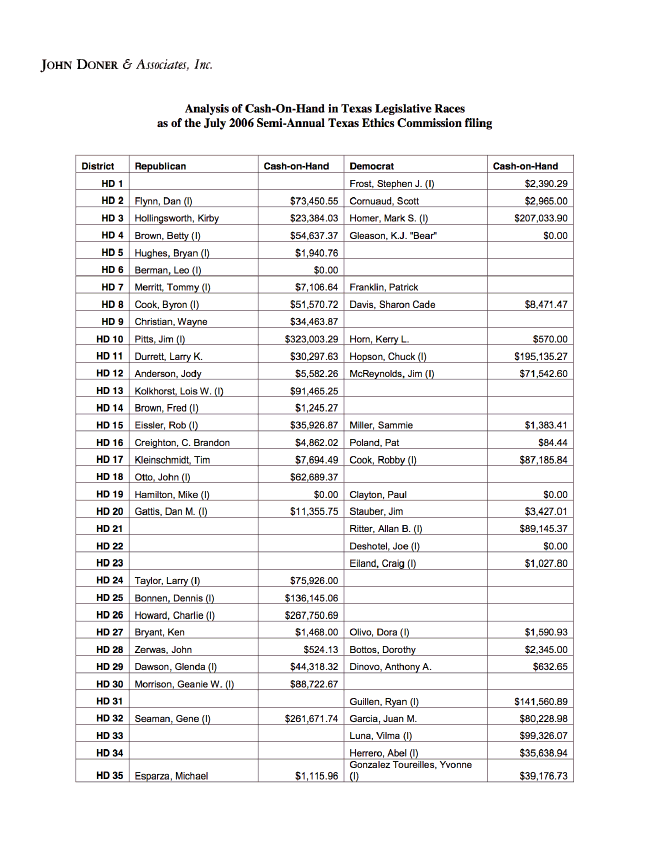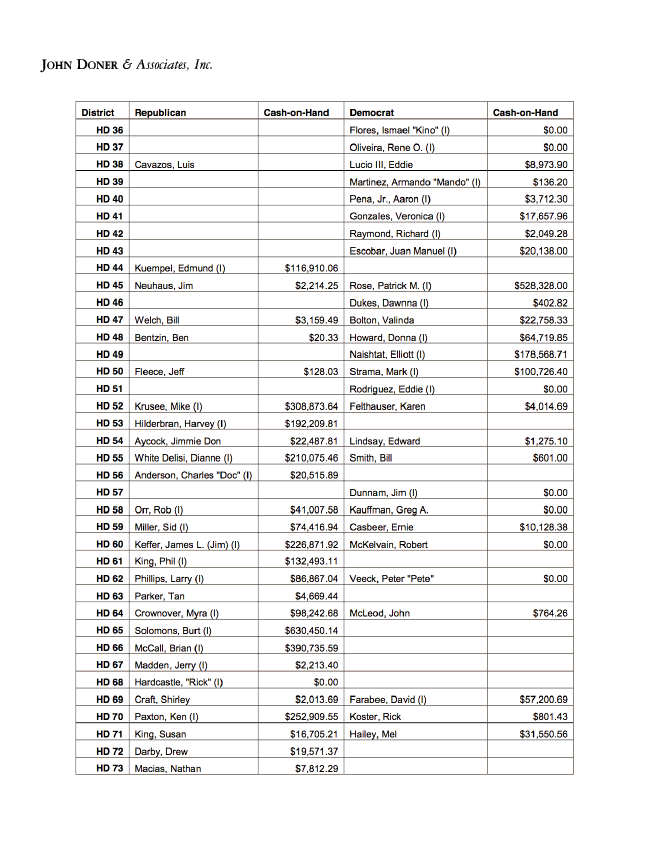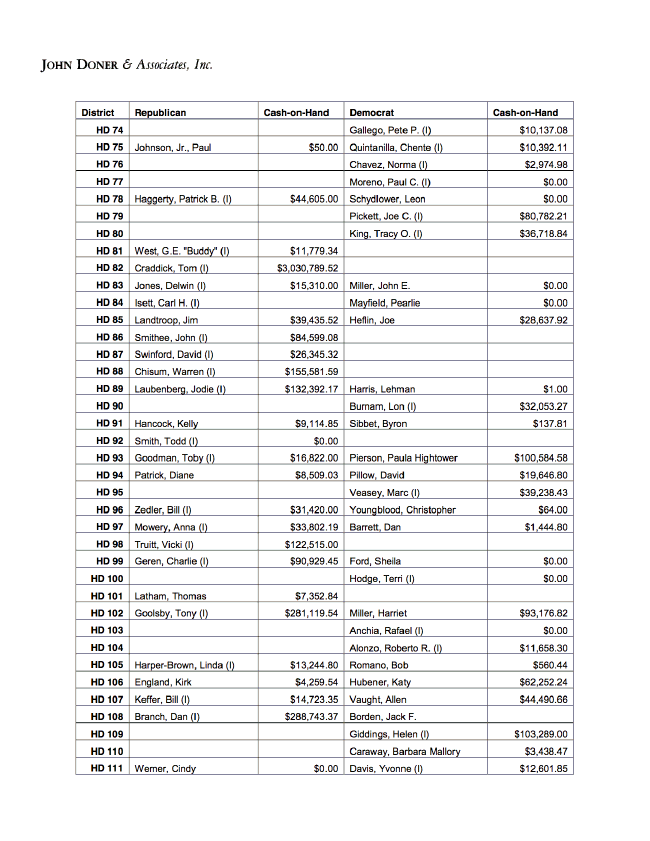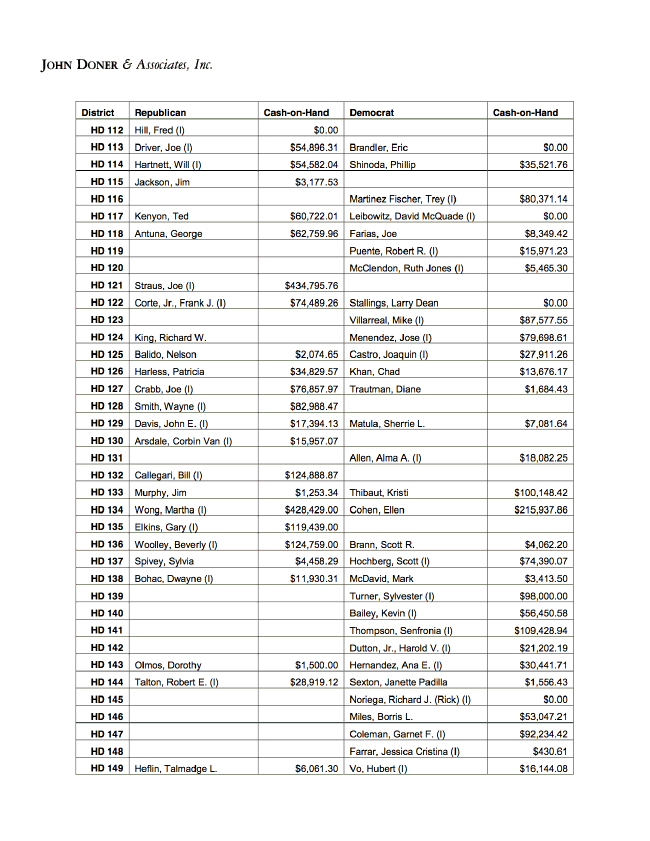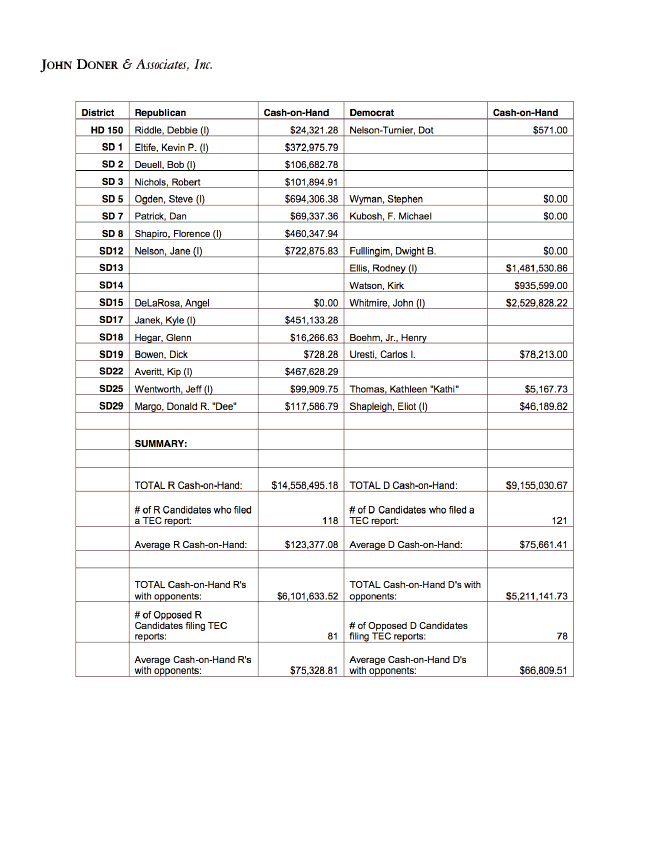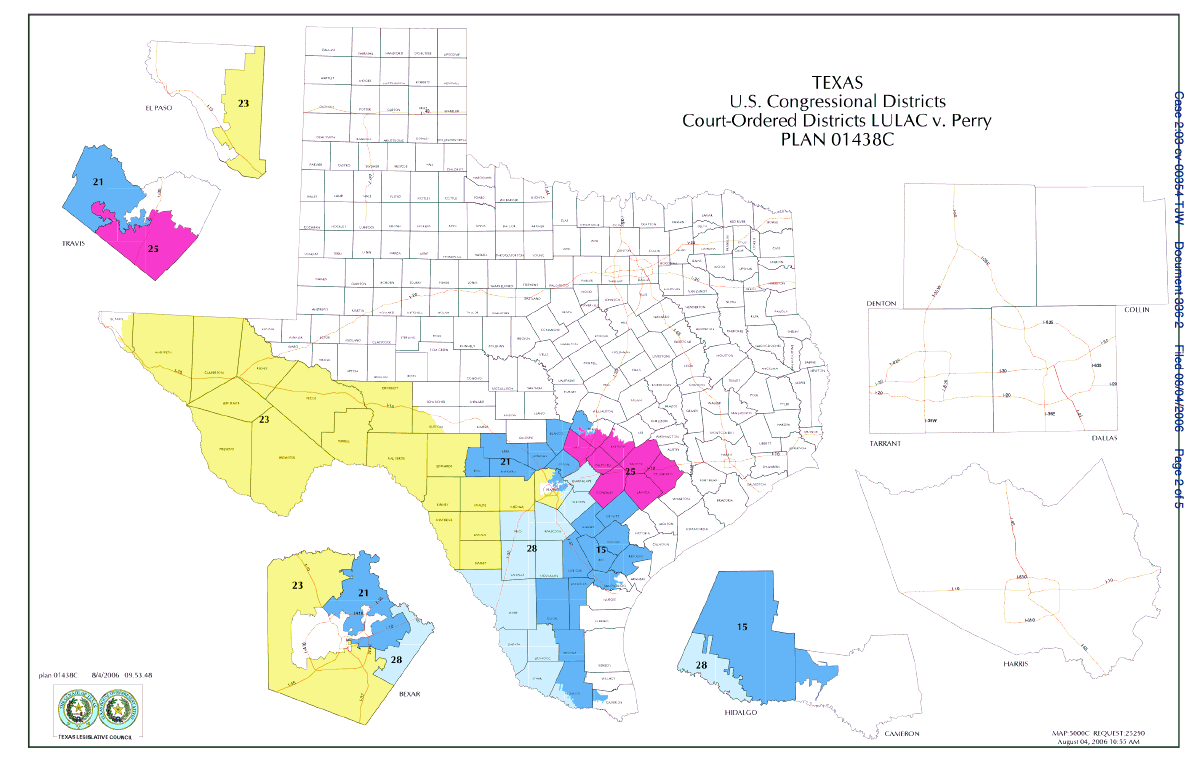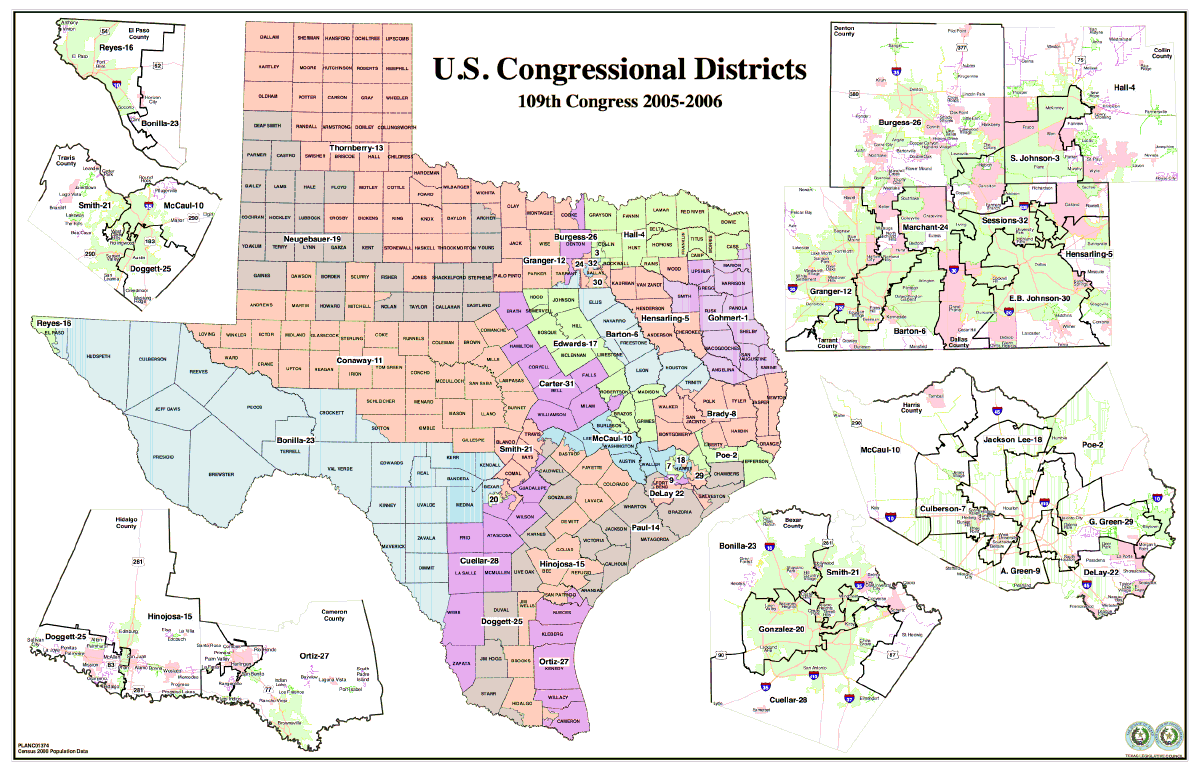A state sales tax refund to "a large direct pay taxpayer" will cost the City of Stafford over $2.5 million — a stunning bit of news for a municipality with an annual budget of about $20 million.
State Comptroller Carole Keeton Strayhorn's office sent the city a letter saying a big taxpayer in that town overpaid its sales taxes from January 1995 through the end of 2003. The city got $2,557,340.98 more than it was due in those years, according to the letter and, as a result, has to pay it back to the state, which will pay it back to the taxpayer along with the sales tax money that went into the state's purse.
The taxpayer wasn't named in the letter, and neither the comptroller's office nor the City of Stafford would name it. That's customary: the secrecy of tax records is protected by law.
Taxpayers, of course, have the right to disclose almost anything they want about their business, and based on public documents, the taxpayer in this case appears to be Texas Instruments. That Dallas-based company makes chips in Stafford. And it reported a $57 million refund on state taxes from semiconductor sales in its second quarter financial reports, enough to add $.03 to the company's earnings per share for the quarter ended June 30. "Our tax refund was from the state of Texas," said Sharon Hampton, a spokeswoman for the company.
Stafford's local sales tax is two cents; the state's share is 6.25 cents; based on the assessment to the city, that means the total refund for that one plant totaled $10.5 million. TI has facilities in several other Texas cities like Richardson and Sherman that might, depending on the locations of the company's sales, could also be on the comptroller's dunning list. Our inquiries about those cities were pending at our deadline.
Leonard Scarcella, who's been Stafford's mayor since 1969 (that's no typo), is flabbergasted by the state's assessment. "We have done everything in our power, played by all the rules... now we find ourselves penalized by things beyond our control."
Scarcella, a tax attorney by trade, says it's unusual for the comptroller's office to go back more than four years in a case like this unless it's been going on for some time. If it's an old case, he says, the state never let the city know it was spending revenue that was being contested by the taxpayer. He takes care not to point to any particular taxpayer, but says he didn't get a heads up from the company involved and would have appreciated one.
Others familiar with state tax law and procedures say it's common to "leave the statutes open" for large taxpayers, both for overpayments than benefit them and for underpayments that benefit the state. On average, that's beneficial to both sides.
And the state's terms for local governments caught off-guard by refunds amount to interest-free loans. State tax collectors generally give local governments years to pay these things back, and Scarcella says someone on the city staff pointed out the bright side — that the city got the use of $2.5 million it wasn't really entitled to. But, he says, $2.5 million is a lot to swallow. "Let's say it was $50,000. I'd still be irritated that they kept the statute open for 11 years, but it would be something we could absorb."
Stafford has the distinction of being the biggest city in Texas without a local property tax. They have one for schools, but not for the city government. Scarcella says sales taxes bring in about $12.5 million annually, and the rest of the budget is funded with money from other sources.
He's concerned about the city's bond rating. If the state can pull back money that's already come in, the bond folks might wonder whether the income reported by a city is real and stable, he says. He's miffed that the city had no say in the negotiations that apparently took place between the comptroller and the taxpayer.
The city's lawyers and finance people are poring over the situation, but if they have to pay, Scarcella says they'll probably take ten years to do so. The state doesn't charge interest on these things, so that would amount to about $23,000 a month.
The Wheels of Justice
Six federal judges have their mitts on two pieces of the state's congressional puzzle. One is whether Tom DeLay ought to be on the ballot in November. The other is over the maps used to elect members of Congress from the state.
And both arguments landed in the same week. Three judges from the 5th U.S. Circuit Court of Appeals in New Orleans will decide whether the Republican Party of Texas has the legal right to replace DeLay on the ballot in November.
If you're new, or you've been on vacation, here's the short version: DeLay won a four-way GOP primary in March. He later announced he was resigning his congressional seat and moving his official residence to Virginia, which disqualifies him from serving in Congress as a representative of Texas' CD-22. The GOP moved to replace him on the ballot, but the Texas Democratic Party sued, saying DeLay can come off the ballot, but the GOP can't replace him.
A federal judge (appointed by a Republican president) agreed with that, saying the residency of a congressional candidate, under the U.S. Constitution, doesn't come into play until Election Day. That's not here yet, and DeLay is neither dead nor disabled, so the question of whether DeLay will be eligible on Election Day isn't ripe. DeLay himself testified in lower court that he didn't know where he'd be that day.
The Republicans appealed to the 5th Circuit. A three-judge panel heard the arguments — including the argument that state election officials really, really hope for a quick answer — and set out to make a decision. It's their timetable now.
When the "P" in "G.P.S." Stands for "Political"
Meanwhile, a federal three-judge panel waited for arguments over the briefs and the maps filed by lawyers working on Texas congressional districts. The U.S. Supreme Court says the biggest geographic district in the state — Republican Henry Bonilla's CD-23 — is illegal and needs to be reworked. The judges are looking over maps from the state, from the American G.I. Forum, from Travis County, the League of United Latin American Citizens or LULAC, Texas Democrats, members of Congress and others involved in the suit.
The judges could adopt one of the maps drawn for their consideration or do their own artwork. The top-level anxieties for the political class center on how many districts they'll alter and on whether any sitting members will be paired with each other or drawn into territory where dangerous opposition waits. Bonilla and Democrat Henry Cuellar, D-Laredo, for instance hope to avoid a pairing. The state's suggested plan would pair U.S. Reps. Lamar Smith, R-San Antonio, and Lloyd Doggett, D-Austin, in a district that favors Smith (Doggett could run elsewhere but would have to move, eventually).
Any district that gets altered — even a little bit — will likely be subject to a new set of elections. Primaries run in March would be tossed aside in favor of special elections under new lines, if precedents on this sort of thing are followed. The proposed maps tinker with as few as four districts and as many as seven of the state's 32 congressional territories.
As with the DeLay case, state election officials hope the federal panel will make quick work of it, but federal judges don't have to follow any deadlines but their own.
The Shrinking Media
A merger that's been talked about for years — between the Austin bureaus of the Houston Chronicle and the San Antonio Express-News — is finally a done deal. Those are the two biggest Texas papers in the Hearst Corp. chain (which also includes the Beaumont Enterprise, the Laredo Morning Times, the Midland Reporter-Telegram, and the Plainview Herald). They've already merged in terms of content; the San Antonio crew will move into an expanded office when the contractors are done in a month or so.
It's not, at this point, an attempt to save money, though the general trend in the news business is to shrink payrolls whenever possible. That's not a prediction of what might happen here, just an observation of what's going on in the rest of the industry, especially in subject areas that are relatively weak attractions for readers, like politics and government.
The new bureau has serious reporting chops and decades of institutional memory. The Chronicle's Clay Robison will be bureau chief; San Antonio's Peggy Fikac will be deputy chief. Everybody else from both bureaus stays on: Janet Elliott, Polly Ross Hughes and R.G. Ratcliffe from the Chronk, and Gary Scharrer and Lisa Sandberg from the E-N. Lisa Falkenberg works in the Chronicle's Austin bureau, but doesn't regularly cover government or politics.
The merger creates a powerhouse bureau — only The Dallas Morning News is comparable in size — but also reduces competition for news in state politics. While Hearst might have been wondering why they were paying two reporters to cover the same events, the subjects of that coverage were getting one more nosy inquisitor than they'll get in the future.
In that sense, it continues a long trend in this and other statehouse reporting corps. Where there were once four or five television news bureaus in Austin from Dallas and Houston, there are now none. Just a few years ago, the Capitol was covered by two wire services, eight big city papers, three or four radio outlets, and a handful of bureaus representing smaller newspaper chains. Now, in order, the corresponding numbers are one, three, two, and zero.
Blogs are new to the mix, but most are partisan by design. And there are four newsletter/Internet outlets in the mix, including this one. At one time in the mid- to late-1980s, there were twice that many.
Mission Accomplished
Put us in the minority on this one, but it looks like Carole Keeton Strayhorn might have drummed up enough free coverage on TV and in the papers and on radio talk shows to connect her old "One Tough Grandma" slogan to her newish moniker.
Strayhorn dropped her lawsuit to get "Grandma" inserted on the ballot as her nickname. But the fight to that point got a ton of coverage, giving everybody the opportunity to connect the new name with the better-known slogan.
You can find lots of folks — particularly in the sealed political terrarium of Austin — who'll tell you she looked silly in pursuit of the nickname and that nobody bought it. That'll be apparent, one way or another, when the campaigns are over in 100 days or so.
Strayhorn and her political advisors have said all along that her numbers "go up ten points" when "Grandma" is included in the mix. Their best outcome would have been getting the name on the ballot. But they've been careful to roll out every twist and turn in the story for maximum coverage, and that's the second best outcome they settled for.
Strayhorn dropped the name hunt when a judge in Austin said jurisdiction belonged with another court. Rather than keep it up, Strayhorn — most recently elected with the last name Rylander — announced she'll move on down the road.
Frustrated Inquisitors
One of several Travis County grand juries that looked into corruption in campaigns and government in Texas ended its business earlier this year with a two-page "report" to a state district judge complaining of vague state laws and a state Ethics Commission appointed by the people it's supposed to police.
The grand jurors were particularly irked by state regulations for financial disclosure by public officials. The law and the commission's interpretation of it allowed one lawmaker — they didn't attach the name — to list his occupation as a self-employed consultant without saying who was paying him for his consulting services. They wrote that "there was obvious misconduct on the part of the public official" but said they were unable to do anything about it because of that law and regulators' interpretation of it.
They were critical, too, of the makeup of the commission itself, especially the ties between the strictly bipartisan panel and the people who appoint them to regulate the people who appoint them. "It is incredible that the district attorney's office is thwarted in their efforts to prosecute public officials because they are allowed to hide behind the lax and vague codes of the Texas Ethics Commission," they wrote.
They ended by suggesting the state save some money by eliminating the agency and "redirect those dollars to more needy priorities." That grand jury disbanded in February.
The Dog Days of Summer
All sorts of stuff happened while we were out. But the political season won't be fully engaged until September, people are on vacation, and a lot of the news can be rolled out radio-style — short and sweet. To wit:
• The Texas Debates — gubernatorial face-offs sponsored by KERA-TV in Dallas — are set for October 5. Attendance isn't yet set and the kvetching over that will likely take up a couple of week's time in September.
• Attorney General Greg Abbott's decision to join the GOP's side of the Tom DeLay's ballot-swapping case bugged everyone on the left except for the lawyers who argued the case. "He's got every right to do that," said Cris Feldman. "But he didn't make the right arguments." Abbott's aides say he was defending the state law that would allow DeLay to be replaced.
• Scuttlebutt from Gov. Rick Perry's reelection camp is that the goal is to win with more than 50 percent of the vote. They're confident enough about the race, what with three other candidates splitting most of the not-Perry vote. But it's difficult to find political pros in either camp who think anyone can break out and get more than half the vote. And for the umpteenth time, if you're asked, there are no runoffs in general elections. Whoever gets the most votes wins. Theoretically, with five candidates in the race, the next governor of Texas could get in with 21 percent of the vote. Theoretically.
• State Rep. Carl Isett, R-Lubbock, phoned in his latest fundraiser, calling from his post in the Middle East to yack for 20 minutes with people gathered in Austin to contribute to his reelection campaign. His wife, Cheri Isett, took his spot in the Legislature during the special session on school finance, and stood in at the funder, too. He's in the Navy Reserve, posted in Kuwait until next month.
• As the hottest part of the U.S. election season begins — and with border and immigration issues leading voter interest in many polls, the governors of the ten states that touch the U.S.-Mexico border will meet in Austin. The Border Governors Conference includes the four states from this side — Texas, Arizona, California, and New Mexico — and the six from the Mexican side —Baja, Coahuila, Chihuahua, Nuevo Leon, Sonora, and Tamaulipas.
• On the same day it announced the academic rankings of Texas schools, the Texas Education Agency named the members of a board that will investigate testing "anomalies" at school campuses and districts around the state. You'll find the members of the panel in Political People further down. As for the campuses and districts, the numbers rose on both ends. There are more exemplary districts than last year — that's the top rating — and more academically unacceptable ones, too. That's the bottom ranking. The good grew faster than the bad, though, with 555 campuses, up from 304 a year ago. The number of stinkers grew to 321 from 264. Most public school students in the state are in places rated acceptable, recognized or exemplary. Almost one in 20 (4.7 percent) are in schools or districts with unacceptable ratings. You'll find charts and tables galore at www.tea.state.tx.us/perfreport/account/.
• Public Strategies Inc., the Austin-based public affairs firm founded by Jack Martin and a small group of fellow political operatives, is being purchased by a global outfit called WPP. All involved say the Austin firm will operate independently. WPP also owns other firms with presences in the state capital: Burson-Marsteller, and GCI.
• Watching the freebie Internet polls over the last few weeks has been like the fifth-grade project where you watch the worms squirm around in the bottom of a Styrofoam cup. After a while, it's more interesting to the worms. But the trend is solid, more or less, with Gov. Rick Perry sitting in front and the three main challengers — Democrat Chris Bell and independents Kinky Friedman and Carole Keeton Strayhorn — in a lockup somewhere around 20 percent. Libertarian James Werner, when he's included in the polls, registers far behind in the position customary to his party (so far) in Texas politics.
Rasmussen talked to 500 Texas voters, finding 40 percent for Perry, Strayhorn at 20, Friedman at 19 and Bell at 13. Side interest: That poll has Perry's job rating at 56 percent; George W. Bush got 53 from those same Texans.
The Wall Street Journal/Zogby poll has Perry at 38.3, Bell at 20.8, Friedman at 20.7, and Strayhorn at 11. In the U.S. Senate race, they've got Republican Kay Bailey Hutchison at 52.2 and Democrat Barbara Ann Radnofsky at 36.7 percent. They're a little sloppy over there; the write-up on the governor's race was never updated after the special session on school finance and they're still dinging Perry for the failed sessions that preceded it.
• Van Taylor, the Republican challenging U.S. Rep. Chet Edwards, D-Waco, got a media and fundraising visit from U.S. House Speaker Dennis Hastert, R-Illinois. That's a target seat for the GOP, which wants to knock off the Democrat who represents George W. Bush (and everybody else in Crawford) in Congress.
• The Texas Supreme Court named a task force to study improvements in jury selection. Judge David Peebles of San Antonio will oversee it. They'll look at everything from voter and driver rolls used to call jurors to the excuses people use to get out of juries to you name it. Recommendations are due in December, in time for the court to ask lawmakers for any changes that might follow.
• Gov. Perry picked up reelection endorsements from a group of South Texas mayors: Rene Castillo of La Villa, Richard Cortez of McAllen, John David Franz of Hidalgo, Kevin Hines of Rio Grande City, Ric Morales of Donna, Polo Palacios of Pharr, Ramiro Rodriguez of Palmhurst, Rick Rodriquez of Harlingen, Norberto "Beto" Salinas of Mission, Ramiro Silva of Edcouch, and Omar Vela of Progresso.
Political People and Their Moves
Check off the box next to Vilma Luna's name — rumors, reported here and elsewhere, that she was signing with Hillco Partners turned out to be true. She and her family are moving to Austin and she'll be working with Buddy Jones, Bill Miller, et al before Labor Day. Luna's last day in the Texas House was July 31; the Corpus Christi Democrat — a key member of Republican House Speaker Tom Craddick's leadership team — first took office in 1993.
Did schools or teachers help students cheat on standardized tests? That's the question for a special panel appointed by Texas Education Commissioner Shirley Neeley. She wants five people to look at "alleged testing anomalies." They are: Dallas education consultant Carol Francois, a former associate commissioner at TEA; Texas Association of Business CEO Bill Hammond; Sylvia Hatton of Edinburg, executive director of the Education Service Center there; George McShan of Harlingen, a retired dean at Texas State Technical College and former president of the Texas Association of School Boards and The National School Boards Association; and A.J. Rodriguez, chairman of the San Antonio Hispanic Chamber of Commerce. Olga Garza of Austin, a consultant and former school board member there, will by the coordinator for what's officially called the Commissioner's Task Force on Test Security.
Mark Borskey is leaving the governor's office, where he worked as a legislative liaison, for the lobby, where he'll do the same kind of work for private-sector clients. He'll do some work on his own, and some in cahoots with Ron Lewis and Patricia Shipton. He'll remain a government guy until the end of this month. That leaves the legislative shop empty; Victoria Ford, as we've mentioned before, is also going to the private sector lobby. Most rumors for the last several months have had Sen. Ken Armbrister, D-Victoria, moving over to run that office (he's not seeking reelection), but no hires have been announced.
Rena Pederson, the former editorial page editor at The Dallas Morning News, is going to work for Karen Hughes in the Bush Administration. Hughes works on "public diplomacy" in the State Department; according to that agency's website, she has been "tasked by President Bush with leading efforts to promote America's values and confront ideological support for terrorism around the world."
Blake Hawthorne is the new clerk for the Texas Supreme Court. He's been a staff attorney there and a former assistant attorney general. He'll replace Andrew Weber, who left after four years in the post to return to his private law practice.
Kerri Davidson is leaving the Pink Building, where she's worked for ten years for Rep. Edmund Kuempel, R-Seguin, for the Texas Youth Commission. She'll be the new chief of staff there.
Ron Urbanovsky, who ran the crime lab for the Texas Department of Public Safety, retired after 37 years at that agency and plans to raise cows. Pat Johnson, who was field laboratories manager, will replace him at the crime lab.
Joel McKinney, currently a DPS captain in Garland, is getting a promotion to major and will be the new head cop at the Texas Capitol. Major Morris Arnold, who had that job until now, will be the commander in Region 4, which in English means he's going home to West Texas.
Lt. Gov. David Dewhurst appointed Barkley Stuart, an exec with Glazer's Distributors in Dallas, to the board of the Texas Building and Procurement Commission. Glazer's is a liquor and wine distributor; Stuart's the executive veep and COO there.
Indicted: Priscilla Slade, former president of Texas Southern University, and three other formal officials, on charges related to using university money for Slade's private benefit. Quintin Wiggins, the former CFO, Bruce Wilson, the former Senior VP for Administration, and Frederick Holts, a senior safety system engineer, were also named.
Recovering: Mina Brees, a Democrat running for the 3rd Court of Appeals in Austin, after a heart attack at home and surgery that followed that. She's challenging Judge David Puryear.
Quotes of the Week
Publicist Ken Hoagland, talking about Houston homebuilder Bob Perry and Hoagland's client, San Antonio Dr. James Leininger, in The Dallas Morning News about why the two political financiers have gone public: "What they have in common is both men want to improve the world that has given them such success. They're not off skiing and using their money for entertainment. They're trying to make the world better, and have come to realize that their public policy opponents can frustrate those passions if they don't explain themselves."
Federal appeals Judge Pete Benavides, during the hearing on whether Tom DeLay can be replaced on the GOP's congressional ballot because of his change in residency, quoted in the Houston Chronicle: "I lost a campaign for the Texas Court of Criminal Appeals when my opponent was in Europe, but he was still a resident of Texas."
Republican consultant Royal Masset, in the San Antonio Express-News on a redistricting map proposed by the state: "There's no way in God's creation that the judges are going to approve a Republican map that doesn't have any Democratic congressmen in Travis County."
Dallas political consultant Clayton Henry, talking to The Dallas Morning News on Carole Keeton Strayhorn's working for support in the Dallas suburbs: "She's got strength, she's got money and she's one pissed-off grandma. This is a voter-rich area for her."
Democratic gubernatorial candidate Chris Bell, asked by the Houston Chronicle about Arizona's idea of a $1 million lottery to encourage voter turnout: "It seems a little gimmicky and I would like to see people see it more as their civic duty, but that doesn't seem to have worked terribly well over the course of the last 25 years."
Gov. Rick Perry, in The Dallas Morning News on being knocked for talking to religious groups: "Critics would criticize me if I were speaking to the Busy Bee Quilting Club."
Texas Weekly: Volume 23, Issue 7, 7 August 2006. Ross Ramsey, Editor. Copyright 2006 by Printing Production Systems, Inc. All Rights Reserved. Reproduction in whole or in part without written permission from the publisher is prohibited. One-year online subscription: $250. For information about your subscription, call (512) 302-5703 or email biz@texasweekly.com. For news, email ramsey@texasweekly.com, or call (512) 288-6598.


